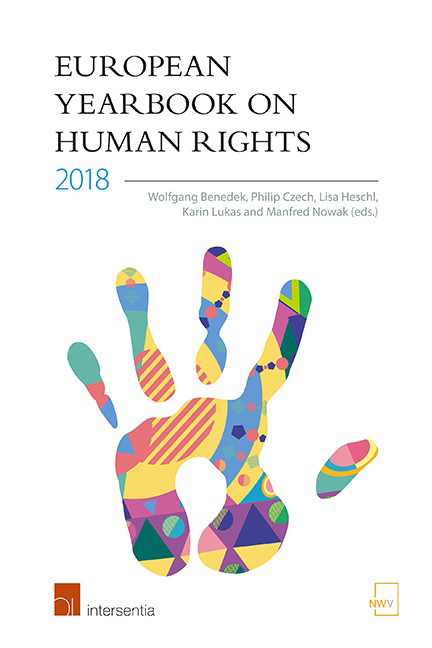Book contents
- Frontmatter
- Scientific Advisory Board
- Editors’ Preface
- Contents
- List of Abbreviations
- List of Contributors
- Part I Topic Of The Year
- Part II Eu
- Part III Coe
- The Jurisprudence of the European Court of Human Rights in 2017
- A Decade of Violations of the European Convention on Human Rights: Exploring Patterns of Repetitive Violations
- The Boundaries to Dialogue with the European Court of Human Rights
- Unprincipled Disobedience to International Decisions: A Primer from the Russian Constitutional Court
- The Impact of ECtHR and CJEU Judgments on the Rights of Asylum Seekers in the European Union: Adversaries or Allies in Asylum?
- The Human Right to Leave Any Country: A Right to be Delivered
- Some Reflections on the Principle of the Best Interests of the Child in European Expulsion Case Law
- Salafism in Europe: A Legal and Political Analysis of Human Rights and Security
- Delays in the Implementation of ECtHR Judgments: The Example of Cases Concerning Electoral Issues
- PART IV OSCE
- Part V Others
- Part VI Book Reviews
- Index
Salafism in Europe: A Legal and Political Analysis of Human Rights and Security
from Part III - Coe
Published online by Cambridge University Press: 31 January 2019
- Frontmatter
- Scientific Advisory Board
- Editors’ Preface
- Contents
- List of Abbreviations
- List of Contributors
- Part I Topic Of The Year
- Part II Eu
- Part III Coe
- The Jurisprudence of the European Court of Human Rights in 2017
- A Decade of Violations of the European Convention on Human Rights: Exploring Patterns of Repetitive Violations
- The Boundaries to Dialogue with the European Court of Human Rights
- Unprincipled Disobedience to International Decisions: A Primer from the Russian Constitutional Court
- The Impact of ECtHR and CJEU Judgments on the Rights of Asylum Seekers in the European Union: Adversaries or Allies in Asylum?
- The Human Right to Leave Any Country: A Right to be Delivered
- Some Reflections on the Principle of the Best Interests of the Child in European Expulsion Case Law
- Salafism in Europe: A Legal and Political Analysis of Human Rights and Security
- Delays in the Implementation of ECtHR Judgments: The Example of Cases Concerning Electoral Issues
- PART IV OSCE
- Part V Others
- Part VI Book Reviews
- Index
Summary
ABSTRACT
This article introduces the topic of Salafism, an Islamic fundamentalist ideology, which it puts within the existing framework of European values as enshrined in the European Convention on Human Rights (ECHR). By first discussing the legal theory behind Salafism, being Shari ‘ a, and illustrating some of the many differences within the Salafist movement, this article demonstrates the non-generalisability of both Shari ‘ a and Salafi sm. It then analyses relevant case law of the European Court of Human Rights (ECtHR) on (violent) religious extremism. It signals that there is need for clarification of the Court‘s perspective on the institution of Shari ‘ a without political pretensions, as well as on the justifiable State interference on freedoms of religion, expression and association and assembly when it comes to (non-)violent support for Shari ‘ a and Salafism. The article further exposes the dilemma which Western societies face between guaranteeing individual rights and safeguarding national security in the fight against terrorism. It concludes that the European values of democracy, rule of law and human rights are put under pressure by the theocratic, universalist pretensions of Salafists, but also by States potentially undermining human rights in the fight against terrorism.
INTRODUCTION
When between 2014 and 2017 the Western world was hit by several terrorist attacks, the general public for the first time heard of the notion ‘ jihadi-Salafi sm ‘. The attacks were claimed by Islamic State (IS), fighting to establish a so-called Islamic caliphate in Syria and North Iraq, inspired by the Islamic fundamentalist theology of Salafism. The terrorist attacks in Paris, Brussels, Nice, Berlin and other places increased the demand of strict security and counter-terrorism measures. Those States which are Party to the ECHR are required to take measures within the framework of human rights and rule of law. This article will examine the following three subjects: the notion of Salafism in Europe; the response of the ECtHR on the issue of Islamic fundamentalism ; and the recently taken counter-terrorism measures in the light of Salafism and human rights.
- Type
- Chapter
- Information
- European Yearbook on Human Rights 2018 , pp. 419 - 444Publisher: IntersentiaPrint publication year: 2018



